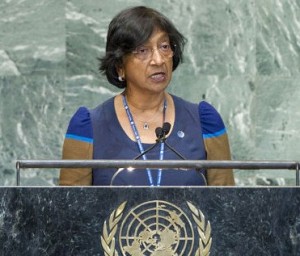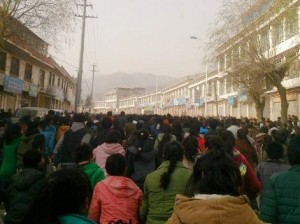
UN High Commissioner for Human Rights Navi Pillay addressing the general assembly in New York on 24 October 2012.
The UN high commissioner for human rights, Navi Pillay, in a rare public criticism over China’s conduct regarding human rights issues, urged China to promptly address the escalating situation in Tibet. Referring to the suppression of human rights she said, “The people of Tibet have been driven to desperate forms of protest”, including over 60 self-immolations in Tibet protesting China’s excessive use of force in their rule.
A spokesman for Ms. Pillay, Rupert Colville, when addressing the assembly recently in Geneva said, “Self-immolations are evidence of how serious the situation in Tibet has become and we felt the time had come to talk publicly about that, as we don’t see any visible signs of progress.”
One of the cases being reported out of Tibet include a 17-year old girl who was severely beaten and then sentenced to three years in prison for distributing flyers calling for Tibet’s freedom and also for the return of the Dalai Lama to Tibet. Others have been sentenced to between four and seven years in prison for making films, writing essays, or distributing photos of self-immolations and other events outside of China. Among the many concerns human rights officials have are the unfair trial standards faced by prisoners as well as the many reports of torture and ill-treatment of detainees.
In a statement made to the general assembly in New York on 2 November 2012, Ms. Pillay said, “More needs to be done to protect human rights and prevent violations.” She urged China to release Tibetans who had been detained merely for exercising fundamental human rights such as freedom of expression, association, and religion, and also referred to, “reports of detentions and disappearances and of excessive use of force against peaceful demonstrators and curbs on the cultural rights of Tibetans”.
She went on to stress that, “Social stability in Tibet will never be achieved through heavy security measures and suppression of human rights. Deep underlying issues need to be addressed and I call on the government to seriously consider the recommendations made to it by various international human rights bodies, as well as to avail itself of the expert advice being offered by the UN’s independent experts on human rights.”
In November 2008 the UN Committee Against Torture recommended that China conduct a thorough and independent inquiry into events surrounding the protests of march 2008, including the reportedly excessive use of force against peaceful demonstrators, most notably monks in Kardze county, Ngaba county, and Lhasa as well as allegations of torture and ill-treatment against those arrested and detained.
According to Pillay, China had pledged to step up cooperation with the United Nations on human rights but she added there were already twelve outstanding requests for United Nations special investigators to visit China to explore various human-rights related issues and called on China to facilitate access.
With regard to the ongoing occurrences of self-immolations the High Commissioner also called on Tibetans to refrain from resorting to such violent forms of protest and urged community and religious leaders to use their influence to help stop this tragic loss of life.
“I recognize Tibetan’s intense sense of frustration and despair which has led them to resort to such extreme means”, she said, “but there are other ways to make those feelings clear. The government also needs to recognize this, and permit Tibetans to express their feelings without fear of retribution.”




 Print
Print Email
Email